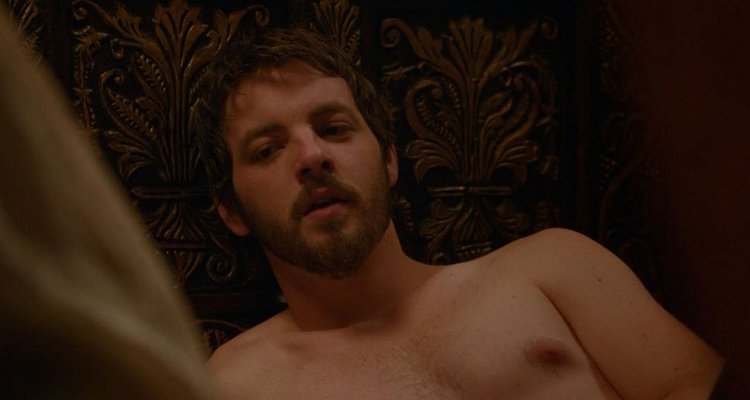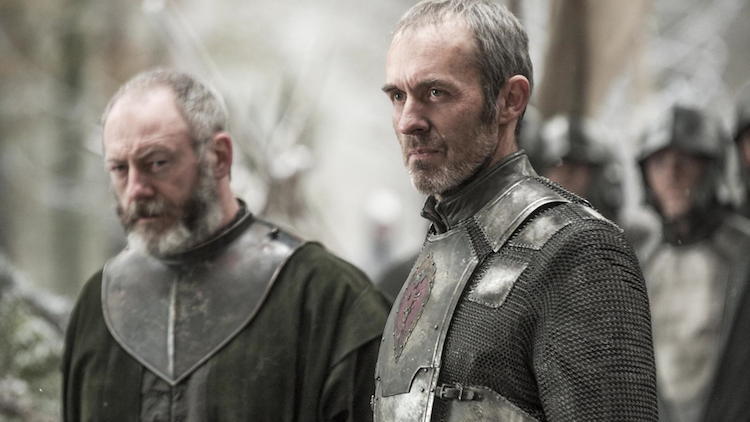Renly Baratheon: Queer Icon
Written by Ian Thomas Malone, Posted in Blog, Pop Culture
Power is a dangerous thing to assign motive toward. Its allure is so strong that it tends to skirt the good/bad spectrum in weird ways, as the seemingly noble can turn out to be completely full of it. People, just or evil, often find themselves drawn to power for the very same reasons.
As someone who’s championed the #StandWithStannis movement from the moment D&D committed character assassination against the One True King, I’m never been a huge fan of Renly Baratheon. He’s a terrible brother. He’s the kind of guy you might have fun with at a rave, but you probably wouldn’t count on him to show up to help you move apartments. Donal Noye’s observation that, “Renly, that one, he’s copper, bright and shiny, pretty to look at but not worth all that much at the end of the day” (ACOK: Jon 1) pretty much tells you all you need to know about the man.
Except one big detail. Renly is gay. I could say that fact doesn’t matter, or affect any of his decisions, but of course it does. LGBT people don’t live in a world where that fact doesn’t affect the macro order of things, especially one’s employment.
Renly challenged the status quo, not as the rightful claimant, but as the most desirable one. He was not the grumpy choice, the sadistic child option, or one that would split apart the Seven Kingdoms. He didn’t have a great claim, but he had a big army. Under the old way of thinking, that wouldn’t have been enough, but gay people are used to encountering that kind of mindset that tries to keep a hold on the future. Renly wasn’t about to let the dated patriarchal structure dictate his ambitions.
Those who deny the existence of privilege often do so by pointing to a lack perceived “added bonus” for being white or male, ignoring the institutional benefits that stem from a system controlled in perpetuity by the patriarchy, a concept that occasionally manifests itself through the term, “boy’s club.” That concept has altered my approach to career opportunities since I came out, giving the stakes a heightened sense of importance each time one comes around. I am aware that there are plenty people out there who will never give me serious consideration strictly on the basis of my gender identity. Plenty of politicians want to make it so companies can legally discriminate against LGBT people. The playing field has never been fair.
The Westerosi power dynamic shares a similar fondness for nepotism. Kings are born, not chosen. Robert’s Rebellion changed that to some extent, but it wasn’t really until the legitimacy of his offspring came into question that the subject of the line of secession became a point that could be debated. Suddenly an opportunity presented itself.
Enter Renly.
Stannis & Joffrey claimed the Iron Throne by right of birth. Robb & Balon took a more isolationist, regional approach based off theory that King’s Landing was too much of a mess to properly govern over their regions. As for Renly, well, he just kind of wanted it. He said some stuff about how he’d be the best king and all, which probably wasn’t true, but that’s not really that important. What matters is that someone, namely House Tyrell, gave Renly a chance. LGBT people don’t get that many chances.
Can we fault Renly for seizing the greatest opportunity of his life? Some might point to the mess he made, costing Stannis the throne, or how he probably wouldn’t have made a very good king. The fact that Stannis was more qualified to rule Westeros is not that important when you consider that the throne is not decided on merit. The sole consistent qualifier is that the person should be the eldest male heir. Once that certainty was tossed out the window, there really weren’t any merits from which that question should be decided. That’s why war started.
People point to Renly as selfish, ignoring that being king is selfish. Selfish people rule Westeros just as they rule every institution of power. By comparison, queer people don’t rule over all that much. Renly tried to change to that.
There is a counterargument in the sense that as Lord of Storm’s End, Renly was already in a position of power, but this is not particularly relevant. Complacency is the enemy of activism. Few in the LGBT community are interested in settling for the victory of Obergefell v. Hodges when there’s so much progress left to be made. We don’t want to be told to be satisfied. Renly didn’t either.
Renly would not be my choice to rule Westeros, but I admire his drive. He saw something he wanted, went for it, and likely would have succeeded if he hadn’t been executed by a shadow baby. As a fellow member of the LGBT community, I admire his drive. It’s tough to throw yourself out there, knowing some people will laugh and think of you as a fool just because of who you are.
I don’t love Renly, but I’m glad Westeros’ most prominent gay character made a play for the Iron Throne. Life is about opportunities, including the ones you create on your own. Renly knew a thing or two about taking what he wanted, even he’d rather play at tournament than lead men into battle. At least that was his choice to make.












